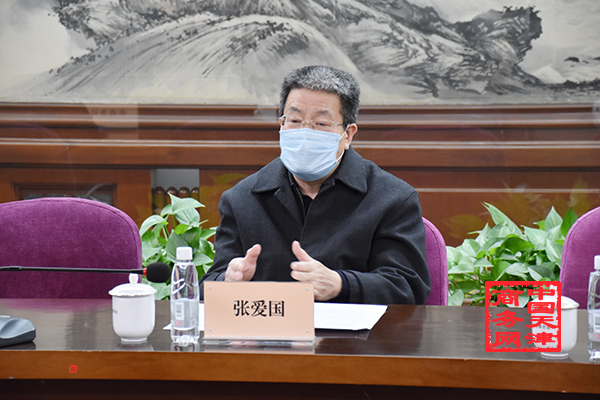- Search
-
Web.
Zhang Aiguo, director of the Commission of Commerce of north China's Tianjin Municipality, was interviewed by China.org.cn on the municipal government's efforts to control the COVID-19 epidemic, and boost the city's economy. The following is an excerpt of the interview in Q&A form.

Zhang Aiguo, director of the Commission of Commerce of north China's Tianjin Municipality, speaks in an interview with China.org.cn. [Photo by Li Rui/China.org.cn]
China.org.cn:
What has the commission done to guarantee market supplies, and stabilize commodity prices?
Zhang Aiguo:
Commodity prices, routine inspections and the supply of protective items are central to our job. After the municipal government initiated its first-class emergency response mechanism, we encouraged all major supermarkets to increase their stock and purchases, and urged all farm produce wholesale markets to open on Jan. 27. We also helped Master Kong, an instant noodle company, to find enough raw materials and workers so that it could start producing on Jan. 28 on three production lines. So far, 14 production lines of the company have resumed operation, with a daily output of more than 8.8 million packs.
We strengthened routine inspection on daily necessities, and monitored stocks and flows of vegetable in local farm produce markets. We have put 6,300 tons of vegetables and 50 tons of meat onto the market. We have worked with relevant departments to jointly maintain market order and stabilize commodity prices.
Besides, we set up special teams to boost supply of masks and disinfectants by increasing local production capacity and purchasing more from outside the city. We mobilized foreign trade enterprises, foreign-funded ventures and overseas agencies to import masks from abroad, and some have been brought in from Russia, South Korea, Malaysia and Hungary. We have also mobilized Blue Moon, a hand sanitizer producer, to increase its supply to supermarkets, such as Wu-Mart and Jin'gong.
We have applied for some masks and thermometers from the epidemic control headquarters of the city and allocated them to the needy enterprises. We also worked with the Tianjin Traffic Management Bureau and Tianjin Municipal Transportation Commission to open green channels for vehicles delivering protective items and equipment, and to support the resumption of industry and business.
We also opened a 24-hour hotline for consultations on transportation from enterprises, so as to ensure life necessities can be delivered smoothly.
China.org.cn:
What has the commission done to support the resumption of industry and offset their economic losses during the epidemic?
Zhang Aiguo:
We have issued a series of documents to support the enterprises, as well as some implementation rules on industry-supporting policies related to life necessities, cold-chain logistics, e-commerce, services and foreign trade. We actively carry out municipal government's supportive policies it has introduced for enterprises and foreign trade companies.
We have published epidemic control guidelines for restaurants, hotel, housekeeping, hairdressing and laundry and dyeing sectors, office buildings and shopping malls.
We have issued notices on the government's assistance to help foreign trade enterprises to overcome epidemic difficulties and reduce their losses, the government's measures to stabilize foreign trade enterprise development, and legal consulting issues related to the enterprises. We have jointly issued a notice on financial services for small and micro businesses with the Tianjin Branch of the Bank of China. We provided foreign trade enterprises with supports and services in market expansion, legal aid, and financing.
We also worked on drafting regulations with the city's industrial and information bureau, the market supervision commission, to reduce fees, cut taxes and lower factor costs for enterprises.
China.org.cn:
What difficulties and problems have been encountered while helping the industries and enterprises to resume production?
Zhang Aiguo:
We assigned foreign trade, foreign funded enterprises and logistics enterprises to major officials of the commission, who are responsible to help them resolve their practical problems, so the policies can be customized to the needs of different enterprises. We worked with the Tianjin Branch of the Bank of China to offer financial services to the enterprises, and guarantee the foreign trade, logistics, pharmaceutical research and development, life necessities enterprises can obtain loans with one-year preferential interest rate.
Meanwhile, we helped some technology enterprises to find more than 1,000 workers to spur their resumption of operation.
We have coordinated with the Tianjin municipal health commission to organize the Teda Hospital and Tianjin Occupational Diseases Precaution and Therapeutic Hospital to conduct physical examinations of their new recruits.
China.org.cn:
As the epidemic is being brought under control, what will the commission do to ensure the smooth operation of the logistic channels?
Zhang Aiguo:
We will continue to serve as the watchdog of the market, monitoring the vegetable stock and wholesale prices, and work with relevant departments to ensure the logistics undisturbed and the reliability of supplies.
China.org.cn:
What is the commission's plan for foreign trade, convention and exhibition in the future?
Zhang Aiguo:
Our focus will be on spurring trade enterprises to resume operation to secure a full victory in regard to epidemic control and economic development. On the one hand, we will continue to carry out all kinds of preferential policies, and on the other hand, we will work with enterprises to help resolve the enterprises' practical difficulties in labor shortage, logistics and financing.
We will push the projects related to the National Exhibition and Convention Center (Tianjin) to resume construction, and ensure construction projects can be finished before the deadline. Meanwhile, we will work closely with all relevant parties to reduce the number of exhibitions and conventions during the epidemic.
Besides, we will carry on the preparation for some scheduled big exhibitions and conventions, such as the World Intelligence Congress, and the Tianjin International Fair for Investment and Trade, and welcome participants from home and abroad.
 津公网安备 12010102000496号
津公网安备 12010102000496号